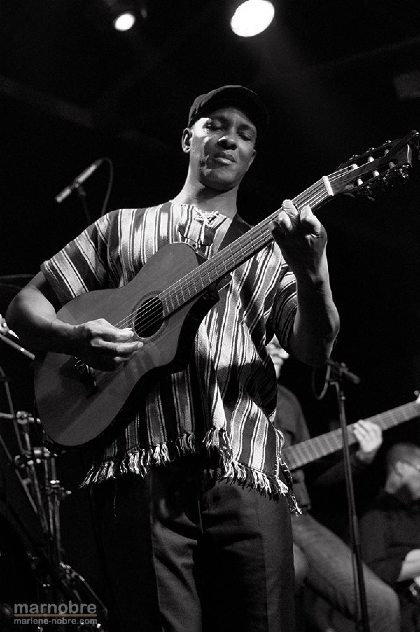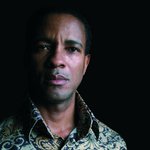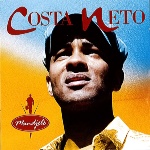- country:Mozambique
- style(s):Roots
- label:Vachier & Associados
- type:Composer/Songwriter
- gender:male
- artist posted by:Alain Vachier Management
Line up
- Costa Neto (Vocals, Guitar)
Costa Neto was born on 5th October at 00.00 to a lighthouse keeper and his housewife. He was born in the very last building in the south of the country of Mozambique: the Ponta do Ouro lighthouse which is situated on a mountain and where his father was working.
In 1965 he attended primary school at a colonial Portuguese catholic mission in Matutuine-Mozambique. In 1970 he entered a seminary, also catholic, and in 1971 he went to a state secondary school in the city of Maputo, at that time known as Lourenço Marques and still under Portuguese rule.
In 1974, after the Portuguese revolution, he stopped school for a year and this time allowed him to begin to teach himself music.
In 1976, after the independence of Mozambique, he returned to school and followed technical studies. In 1980 he left school refusing to follow the official obligatory career path determined-teaching.
From then on he has dedicated himself exclusively to music and in that same year he joined 'Grupo 1' for Mozambican light music.
In 1981, with colleagues he founded the group 'M'bila'. This group would go on to be one of the groups that most revolutionized urban Mozambican music. He led this group until it ended in 1988.
However, his first group was 'ABC78': 1978 being the year in which it was founded.
In 1983 he was entrusted with the responsibility of interim director of the Maputo Youth Club. This was the centre that promoted most entertainment on a regular basis during the post-independence civil war. It was also here that his group 'M'bila' was based.
In 1988 Costa Neto went to Portugal on a trip and he decided to stay and reside in order to be able to continue an artistic career. This brought him enormous difficulties in the early years of his stay.
As an act of solidarity, he became involved with artists from all the Portuguese-speaking countries. Some of them are among the most respected in their countries and he has maintained excellent relations of camaraderie and friendship. It was this that inspired him to create the project 'Fazer' (Do) in 1996, which was sponsored by the United Nations. It involved a large majority of African musicians resident in Portugal besides other public figures and institutions who sympathized with the project.
In 2000, shaken by the catastrophe of the flooding in his homeland, Mozambique, Costa Neto wrote and sang 'Sinónimo Vida' (Life Synonymy). In reality, this became an anthem for victims of the tragedy. Later on, this was edited as a CD single with all proceeds going to the victims.
In 2001 he begins his solo career with the edition of ‘PROTOTYPUS’, a contribution to the development and diffusion of Mozambican and African culture in the world.
From the album ‘PROTOTYPUS’, there were selected original themes like “ÚÈ MWANÊ” to the pan-African CD ‘MOTHER AFRICA’ and ‘KIKIRIGÔ’ for the first CD of ‘MÚSICA DA CPLP’.
Known by many as the most faithful interpreter of Mozambican music in Europe, he has been invited to represent his country in some of the most known events where the Mozambican culture presence is requested, such as participations in the ending concert of the ‘GALEGO EM PÓ’ conference in Santiago de Compostela, Galiza, the editions of the ‘PORTAFRICAS’ festival, the ending of the celebrations in Rome of the 10th anniversary of the peace treaties of Mozambique, the representation of Mozambique in the festival ‘ENCONTROS LUSÓFONOS’, in Lisbon, 2004 and the participation in the concert ‘MUSIC AFRICA’ in Rome, 2006.
In June 2009, Costa Neto releases “Mandjólò”, his latest album. In “the old days”, Maputo was the official name of the last district in South Mozambique. Because they gave their name to the country capital, this district is nowadays called Matutuine. In earlier days, Matutuine was just a small town in the same district. The capital of this district is the small villa called Bela Vista; the name is the same from the “old times”. Matutuine’s population calls Bela Vista by its local name: Mandjólò. The song Mandjólò, that also names the album, evokes that same name in one of the many Mozambican idioms – it’s a ramification from Ronga (native language from Maputo – also known as Xindindindi or Xizinguiri as the natives called it). This song is about the journey of the Mozambican people from the most diverse villages to the big annual party on Mandjólò.
"Mondjólò", an album that brings the reality of Mozambique.





